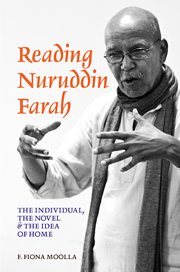Book contents
- Frontmatter
- Contents
- Introduction
- 1 Defining the Individual: Conceptual & Historical Limits
- 2 From a Crooked Rib & the Bildungsroman: Developing the Self, Developing the Nation
- 3 The ‘Gynocentric’ Bildungsroman: Sardines & Gifts
- 4 Modernism in A Naked Needle & Sweet & Sour Milk: Irony, Morality & the Aesthetic
- 5 Close Sesame & the Representation of Heteronomy
- 6 Dissolving the Boundaries of Self & Nation in Maps & Secrets
- 7 Reconstructing the Subject in the Third Trilogy: Links, Knots & Crosbones
- Conclusion
- Bibliography
- Index
5 - Close Sesame & the Representation of Heteronomy
Published online by Cambridge University Press: 05 April 2014
- Frontmatter
- Contents
- Introduction
- 1 Defining the Individual: Conceptual & Historical Limits
- 2 From a Crooked Rib & the Bildungsroman: Developing the Self, Developing the Nation
- 3 The ‘Gynocentric’ Bildungsroman: Sardines & Gifts
- 4 Modernism in A Naked Needle & Sweet & Sour Milk: Irony, Morality & the Aesthetic
- 5 Close Sesame & the Representation of Heteronomy
- 6 Dissolving the Boundaries of Self & Nation in Maps & Secrets
- 7 Reconstructing the Subject in the Third Trilogy: Links, Knots & Crosbones
- Conclusion
- Bibliography
- Index
Summary
It is the most capricious prejudice to believe that a human being is denied the capacity to be outside himself, to be consciously beyond the senses. He is capable at any moment of being a suprasensual being. Without this he would not be a citizen of the world – he would be an animal. It is true that under these circumstances reflection, the discovery of oneself – is very difficult, since they are so ceaselessly, so necessarily connected with the change in our other circumstances. But the more conscious of these circumstances we can be, the more lively, powerful and ample is the conviction which derives from them – the belief in true revelation of the spirit. It is not seeing – hearing – feeling – it is a combination of all three – more than all three – a sensation of immediate certainty – a view of my truest, most actual life – thoughts change into laws – wishes are fulfilled.
(Novalis, fragment 23, from Miscellaneous Observations, 1798)Close Sesame, the final book of the “Dictatorship” trilogy, is unique in Farah's corpus. To capture what makes this novel exceptional it is necessary to be reminded of the constitutive presupposition of the classic realist novel, which modernism and postmodernism, through the specific terms of abrogation, ironically reaffirm. The realist novel may better be distinguished against the genre of the epic which, along with lyric, drama, oral tales and journalistic broadsheets, were drawn into a new genre which, in its openness, appears to elude generic definition itself. The epic is the story of how the hero is lost but finally returns “home” to a “transcendent truth”.
- Type
- Chapter
- Information
- Reading Nuruddin FarahThe Individual, the Novel and the Idea of Home, pp. 122 - 141Publisher: Boydell & BrewerPrint publication year: 2014



